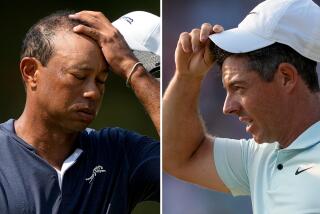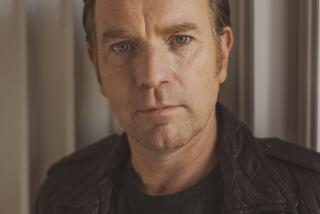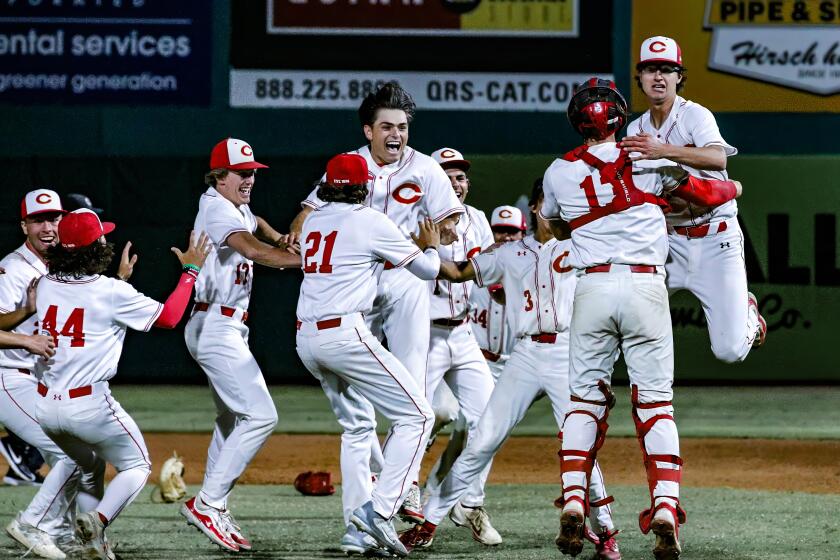Young Man in Love : McEnroe Discovers That There’s Life Away From Tennis
- Share via
Moments after he walked off Wimbledon’s center court in July, having been decimated in the quarterfinals by Kevin Curren’s blistering serves, John McEnroe was asked how he had felt during the match.
McEnroe sighed. “I felt,” he said, “old.”
And then he continued the thought: “It’s a funny feeling, because, as a person, I’m still very young, I’m still learning things every day. But as a tennis player I’m getting old.”
McEnroe is 26. At that age, most doctors and lawyers are just starting their first job. But McEnroe has been the world’s No. 1 tennis player for five years. He is a millionaire many times over. And, he is the No. 1 seed and the defending champion when the U.S. Open now being contested in New York.
Old: This summer, he has been shaken--”scared”--to use his word. He went more than three months without winning a tournament. He was humiliated at Wimbledon--a tournament he has won three times in four years, and a tournament won this year by a 17-year-old, Germany’s Boris Becker. McEnroe is going through jock middle age, that period when an athlete starts getting signals from his body that tell him that, although the end may not be near, it is definitely down the road.
The question for McEnroe over the next several years will be this: Can an “old man” stay at the top in an era when tennis is producing single-minded automaton perfectionists, high school dropouts who do nothing more than hit a tennis ball and collect money?
When Becker was asked what he likes to do to relax, he answered, “I like to practice my tennis.” When 15-year-old Gabriela Sabatini was asked what gave her joy away from the tennis court, she answered, “My joy comes from my tennis.”
Their agents tell them when to play and what products to endorse. Their coaches arrange for 10 hours a day of practice, for hotels, for airplanes, for meals. They are exemplars of achievement and success in the 1980s. Like the associate lawyer who burrows through books all night in pursuit of a partnership, like the newspaper reporter who grinds away all weekend in pursuit of the next Watergate, the babes of tennis do one thing all day, every day.
Their success has a price, of course. They don’t have lives, as most of us have lives. But if they did, would they also make partner, get the story or win the tournament? If not, can there be Life after Success? And what is left when there is no grail of perfection to quest after? It’s a question less sheltered people--and less talented ones--are apt to ask, and perhaps even answer, before they are 26.
As for McEnroe, he said recently: “I know now that there’s more to life than seeing a tennis ball.”
A simple lesson--in theory. But one that many athletes have great trouble dealing with in practice. If this summer is any evidence, McEnroe may not have that problem. He is in love. He has added the word “compromise” to his vocabulary and, even faced with the possibility of losing his grip on the No. 1 ranking, McEnroe can say, “I’m happier now than I’ve ever been.”
He seems to have found a new challenge in life: becoming an adult. McEnroe, the tennis player, is getting older. McEnroe, the person, is getting better.
To his tennis-playing friends, McEnroe has always been “Junior.” The nick name always seemed just right. He is, after all, John Patrick McEnroe Jr. He was also the baby of the locker room, younger than most of his colleagues when he first came on tour full time in 1978. And, he was very much the baby of the court, constantly complaining about line calls, his face a mask of unhappiness even as he accumulated wealth and fame.
During those first years on the tour, McEnroe came to be the personification of the spoiled athlete of today. He appeared to have everything, yet always wanted more. His ranting at officials became as much a part of the show as the tennis and for a time it appeared McEnroe’s magic as a player might be lost amidst the controversy over his personality--his immaturity, his singlemindedness, his obsession with success.
There is paradox in this. The three great rivals of McEnroe’s career have been Bjorn Borg, Jimmy Connors and Ivan Lendl. Two of the three--Borg and Connors--have been far more popular players than McEnroe. Only Lendl, who is perceived by players and fans as a great talent with no guts, is less popular than McEnroe.
Borg, who almost never showed any emotion on the court, became an almost larger-than-life figure during his career. It was only after he quit, burned out at 26, that people noticed that he had dodged playing Davis Cup for Sweden unless he had financial guarantees and had left his homeland for Monaco to avoid high taxes.
Connors, McEnroe’s predecessor as the game’s bad boy, has managed to market a “New Jimmy Connors” image in the last five years. Now married with two children, he is the darling of tennis crowds, the aging (33 last week) bantam fighter who never quits. Connors is just that. He also remains the most obscene player to ever pick up a racket, performing antics that make McEnroe at his worst look like Shirley Temple.
But Connors clowns, plays to the crowd and says all the right things.
“I can’t be that way,” McEnroe says, “I’ve never been good at BS-ing.”
In fact, McEnroe was never as bad a person as he was made out to be. It was McEnroe, not Connors, not Borg, who was always willing to represent his country in the Davis Cup. And it is McEnroe, not Borg, not Connors, who has never ducked a postmatch press conference--win or lose--and McEnroe who has always attempted to answer any reasonable question honestly.
Not that McEnroe was, or is, perfect. But he has been part of that unfortunate celebrity syndrome: Every mistake he has ever made has been made in public because almost nothing in his life is private.
And yet, ever so slowly, McEnroe has changed. His outbursts on the court are far less frequent than they once were. In fact, in The French Open, Wimbledon, the Volvo International and The Player’s International--the four tournaments all three have played this summer--McEnroe had nowhere near as many disputes as either Connors or Lendl.
But he is a prisoner of his reputation. McEnroe knows that. “All I can do is try to learn from the mistakes I’ve made,” he said. “I know it bothers people because I don’t smile on the court and that’s something I’m trying to work on. But I wasn’t brought up that way.”
Growing up in New York, McEnroe was taught that smiling, appearing to have fun, is a sign of weakness. It can also affect concentration. Two weeks ago, when he clowned briefly with Robert Seguso during a semifinal match in Vermont, McEnroe felt the by-play affected his concentration.
McEnroe is never going to win any awards for on-court behavior. He is too intense, too emotional, to change himself over at this stage. But off the court, he is a noticeably different person than he once was.
Certainly, his relationship with actress Tatum O’Neal must have something to do with this. In Paris, with O’Neal by his side, McEnroe appeared relaxed and happy. His loss to Wilander was more a matter of catching a hot player on a surface (clay) that favored that hot player.
But Wimbledon was different. McEnroe left O’Neal behind because he couldn’t stand the thought of being hounded by the British tabloid press for two weeks. That was probably a mistake. The tabs hounded him anyway--”Why didn’t you bring Tatum?”--misquoted him daily and took great joy in his defeat.
McEnroe was lonely at Wimbledon. And unhappy. “All I could think of the whole time was getting the hell out of there,” he said.
And when he lost, he was philosophical. He made no excuses. He even mused aloud, “I’m curious to find out how I’m going to react to this.” In short, he was like any young man in love: He had suffered a setback, but if his girl back home still loved him, he could deal with it.
Six weeks after the debacle of London, he came back to win the tournament in Vermont. He had made some decisions about his tennis, about working harder to stay in shape--a concession to age--and he felt he had come through the losses in Europe a smarter, perhaps even better, person.
“I think what I’ve figured out is that I’d really like to have it all,” he said. “I’d like to win every match, make a great fortune, have a wonderful life, spend time in my houses whenever I want and be able to put up my hands and not have anyone bother me whenever I want to do that.
“But that’s not the way life is. I’ve gotten so much out of tennis, the rewards have been great. It’s not perfect. Even up there, where the people couldn’t be nicer, I’ve had every person in the state come up and ask me if I like Vermont. There’s no escape from that.
“But I think I understand that now and I can handle it. What I want now is the respect of others and respect for myself, from myself. That’s what’s really important.”
What’s most important is that John McEnroe understands now--finally--that no one and nothing is perfect. He uses the word “compromise” a lot. Five years ago he would have had that word excised from the dictionary.
In any profession when one achieves success, there is always going to be someone pushing from underneath; someone younger, perhaps more eager. Everyone--teacher, lawyer, reporter, politician, cop--faces burnout. Athletes face it earlier.
In tennis, it can be acutely painful. Perhaps no other sport is so unforgiving to a player who has lost the edge, either physically or mentally. In team sports, there are others to cover up for you. In golf, you can fade quietly into the pack. Only boxing is comparable: one-on-one competition, players exchanging shots.
But even boxing is different because a faded champion can still get himself a big-money fight based on his name, even after he is well past his peak. In tennis, when you slip, you get embarrassed in early rounds and have to go back to the locker room to face the looks of your colleagues.
For every athlete who retired gracefully, there are 100 who hung on too long. Who can forget Willie Mays stumbling around in the outfield during the 1973 World Series? Muhammad Ali, unable to raise his arms against Larry Holmes? Joe Louis? Johnny Unitas?
Tennis players, fortunately, don’t get that chance. They are forced into the 35-and-over division quickly. But it is often not painless. Many of them play the over-35 tour almost full time, hanging on, not wanting to leave the game behind.
McEnroe says he would like to play tennis for about five more years. Borg quit at 26, unable to deal no longer with being No. 1. Connors, a wonder in that he is still in the world’s top four well into his 30s, still hangs on, still able to rationalize his losses to McEnroe and Lendl and still able to beat almost anyone else.
Chris Evert Lloyd, who has talked of retirement since her early 20s, will be 31 in December. She is still playing, still driven to be No. 1 even after breaking almost every record there is in tennis.
McEnroe says now that he still has the drive to be No. 1, but could live with being No. 2 or No. 3. “I’d like to have my cake and eat it. I’d like to be able to lie on the beach, to be able to have a relationship with a woman in private, not public, and still be No. 1 in the world.
“But to stay No. 1 you have to be willing to do the work, especially when you get older. Right now, I think I’m still willing to do the work. But the day will come when I’m not. When it does, I’ll get out. In the meantime, I’m just trying to become a better person because I know I’ve still got a lot to learn about life.”
One wonders what Boris Becker will know about life when he is 26. Or Sabatini, Steffi Graf, Manuela Maleeva, Aaron Krickstein, Jimmy Arias or any of the other teen-age wonders who were told early by adults to forget everything else and just worry about tennis. One also wonders how they will feel about the adults who stole their childhood from them.
McEnroe has certainly made his share of mistakes. He will be the first one to tell you that. But somehow, through all the controversy and tribulations, he seems to have emerged with a value system to be admired. It was McEnroe who turned down a $1 million guarantee to play in South Africa because of apartheid. He is family oriented, remains loyal to old friends, works for charity--without publicizing it--and has figured out before it was too late that single-mindedness may lead to great wealth but it can also lead to great loneliness.
“I want to be happy,” he said. “And I want the people who I care about to be happy with me.”
McEnroe, the tennis player, may have seen that there’s an end to the road. McEnroe, the person, is just beginning.
More to Read
Go beyond the scoreboard
Get the latest on L.A.'s teams in the daily Sports Report newsletter.
You may occasionally receive promotional content from the Los Angeles Times.










